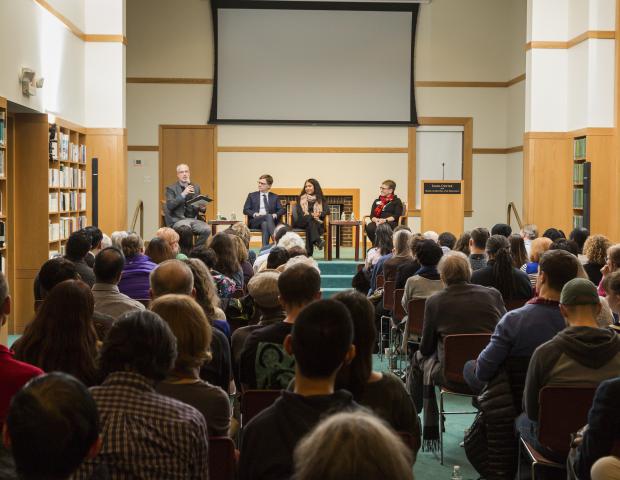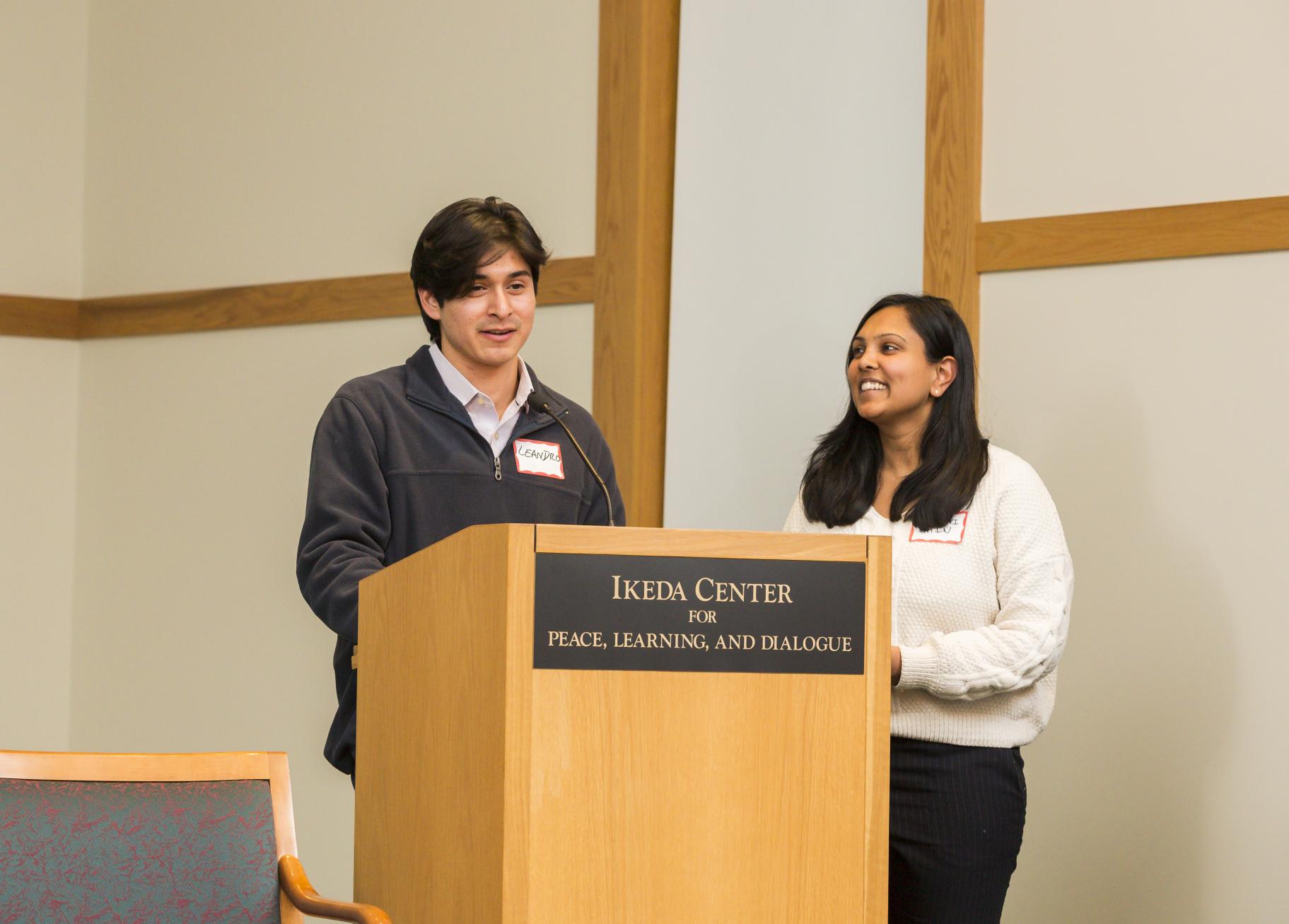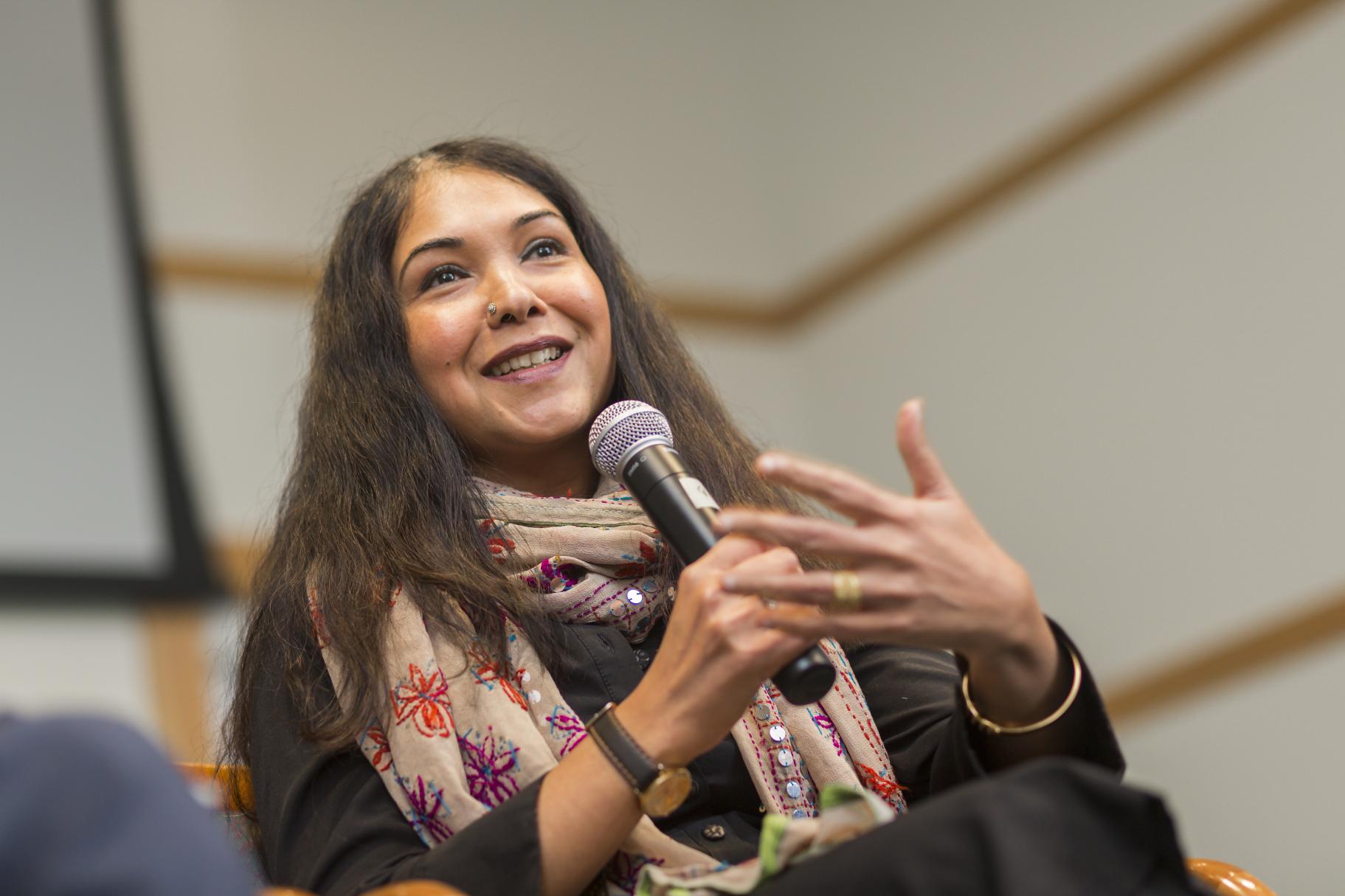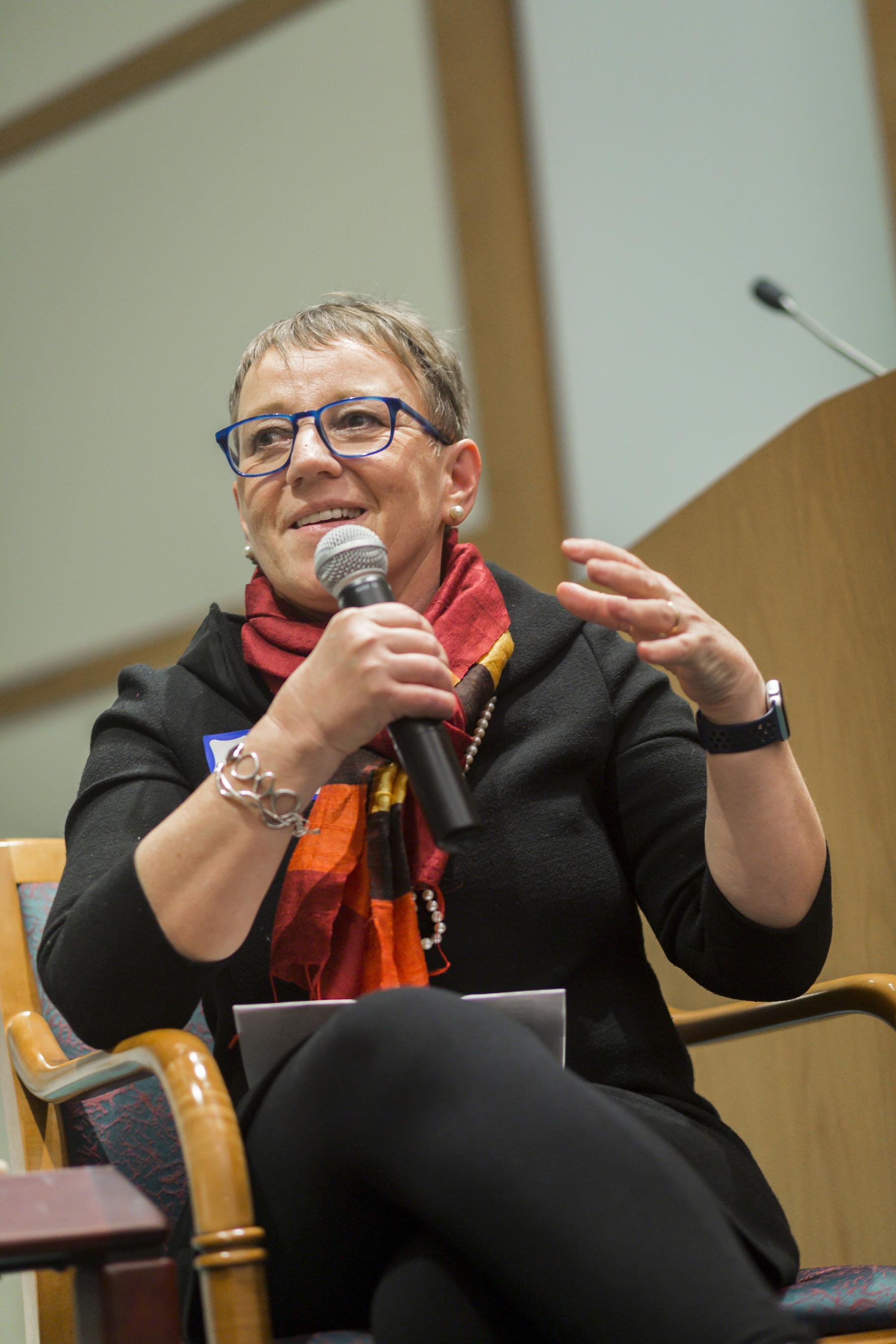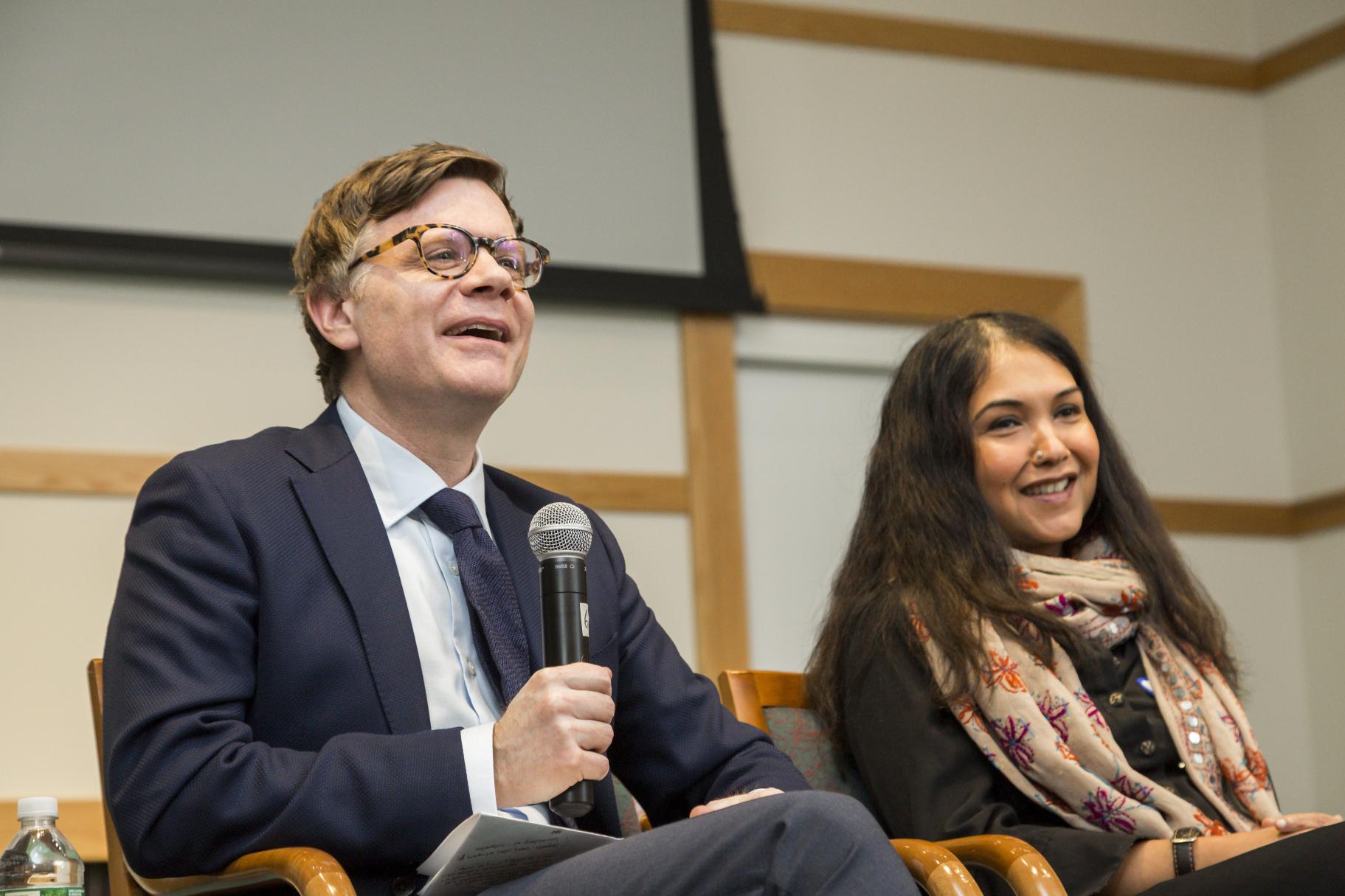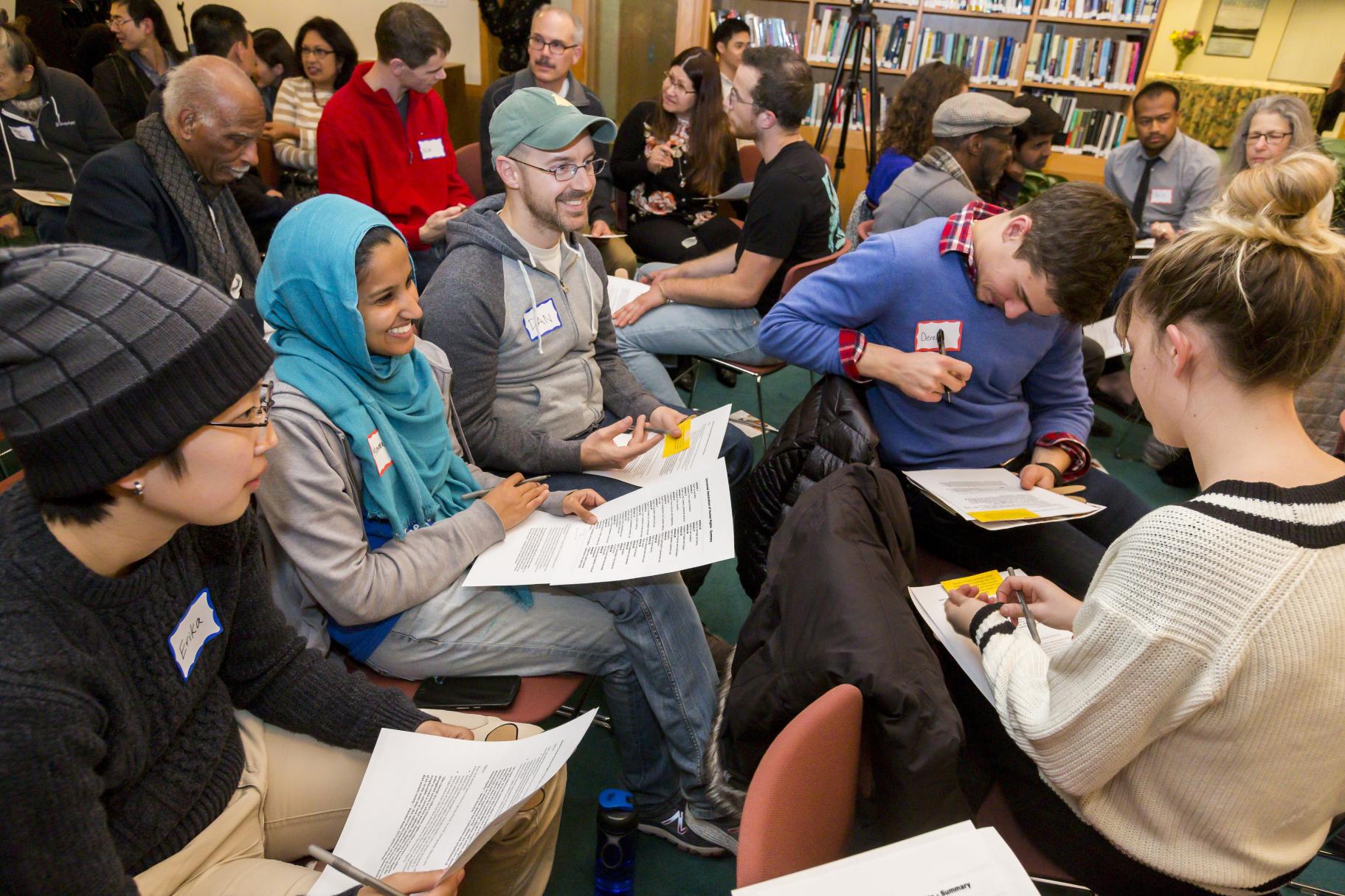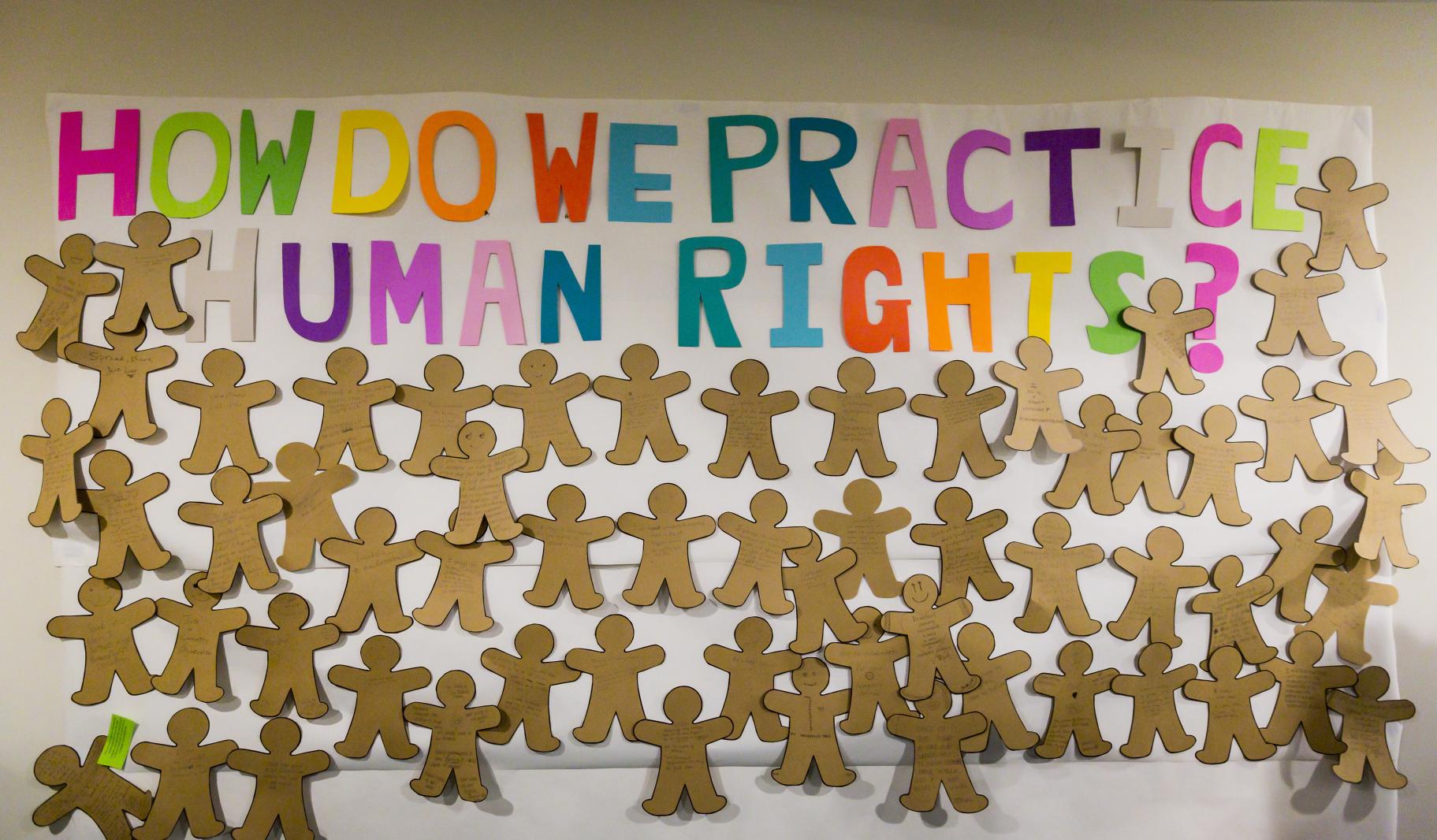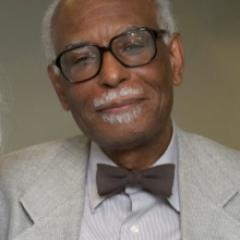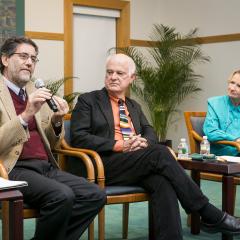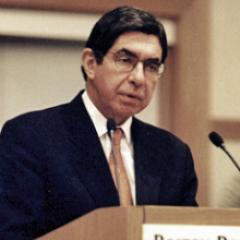2018 Ikeda Forum: How Do We Practice Human Rights?
Executive Director Kevin Maher moderates 2018 Ikeda Forum with speakers Drs. Jason Goulah, Elora Chowdhury, and Catia Confortini
When people talk about the attributes of cultures of peace, they often invoke frameworks of social justice, equity, and human rights. This latter category is usually discussed in terms of the Universal Declaration of Human Rights, adopted by the United Nations General Assembly in 1948.
The declaration has proven especially useful for peace builders of all kinds in that its thirty articles, which clearly and specifically define the rights of all humans, help us avoid the pitfall of becoming overly abstract in our approach to the topic. All this great information notwithstanding, many socially engaged individuals have found that they still don’t have a good sense for how the average person might engage with human rights as they go about their everyday affairs. The Ikeda Center’s 14th annual Ikeda Forum for Intercultural Dialogue, held November 30, 2018, was designed to begin to answer this question.
Called “How Do We Practice Human Rights? A Dialogue on Dignity and Justice in Daily Life,” the event elicited perspectives on this topic both from scholars working in the field and from the more than one hundred Bostonians in attendance. Representing the academic community were Elora Chowdhury, Professor and Chair of the Women’s Gender and Sexuality Studies program and Director of the Human Rights minor at UMass Boston; Catia Confortini, Associate Professor of Peace and Justice Studies at Wellesley College; and Jason Goulah, Associate Professor of Bilingual-Bicultural Education and Director of the Institute for Daisaku Ikeda Studies in Education at DePaul University in Chicago.
A Special Aptitude
The evening event opened with welcoming remarks from Ikeda Center Executive Director Virginia Benson, who noted that this coming together in the cause of human rights is something greatly needed at “a crucial time in the history of our country.” She also noted that this year’s forum was meant to reflect the Center’s evolution over the past year and a half toward being a place where “young people gather, engage in value-creating dialogue, and shape our initiatives.”
As with each Forum, topics were grounded in the thinking of Center founder Daisaku Ikeda. In his view, observed Benson, human rights and human rights education present nothing less than what he has called a “blueprint for life.” In particular, she cited two “touchstones” from his writings that went into conceptualizing the event. First, is the idea that human rights cultures must be built from the ground up. Of this he said:
It has never been more important to create and solidify a movement for human rights education that will foster the social conditions in which people treasure human diversity and dignity within the contexts of their daily lives, so that ever more individuals can recognize and take personal responsibility for the construction of a culture of human rights.
Mr. Ikeda’s second touchstone reflects on the potential of youth.
While they are particularly vulnerable to the effects of the filter bubble in this digital age, youth also have a special aptitude for sharing what they have learned about human rights with others in their lives, making them a powerful force for expanding the circle of those committed to overcoming discrimination and prejudice.
Mr. Ikeda added that the International Campaign to Abolish Nuclear Weapons, which recently won the Nobel Peace Prize, was led primarily by young people. “If members of the younger generation can shape the movement for human rights promotion in a similar way,” he said, “we can surely shift the global current from one of division and conflict to one of coexistence.” With that, she introduced Center Program Manager Lillian I, who led the group in an icebreaker activity and then talked about the growing youth involvement with Ikeda Center event planning.
Lillian explained that the Center’s commitment to youth involvement led to the creation in early 2018 of a youth steering committee consisting of university students and young professionals of diverse backgrounds who meet every other month at the Center to discuss global and social issues. They also help to plan the Center’s Dialogue Nights events. Naturally, they were asked to lend their “special aptitude” to the planning and execution of the 2018 Ikeda Forum. As part of their contribution to the Forum, several steering committee members went to Boston Common to ask regular folks about the meaning and state of human rights today. Two representatives from the committee, Leandro Molina and Prachi Jain, introduced the video by talking about their own personal journeys toward awareness of and commitment to human rights.
Leandro opened with a rhetorical question: Can human rights be understood in terms of personal development, say, as in Maslow’s hierarchy of needs? While it’s worth discussing such questions, he said, it is also vitally important for human rights commitments to move beyond discussion to “become a way of life.” He also mentioned two of his personal motivations. First, is his faith that as humans we “inherently want to do good and need to do good.” The second stems from his identity as an adopted son of lesbian mothers. He saw the adversity they went through even as he himself was bullied. From this he developed a sense of a “moral obligation” to be a part of conversations aimed at human rights and peacebuilding.
Prachi Jain talked about how during the youth committee meetings they “brainstormed, listened to each other, and learned from each other.” If not always in agreement on particulars, they always agreed that “peace and equality are possible.” She noted that the filmed interviews were conducted just one day after the mass shooting at the Tree of Life Tabernacle in Pittsburgh. She concluded that we might not “have all the answers for the creation of an equitable society, but the caring of individuals is a springboard for action.”
The video filmed on Boston Common featured diverse citizens offering their views on four questions. In response to the first question about what human rights mean to them, two complementary themes emerged. The first is that human rights demand that all humans have access to the basics of human well being, including food, clean water, education, and healthcare. The second is that each of us should also possess the freedom to pursue our own peaceful way in life, including the freedom to love who you want and to worship as you wish. In response to the question of whether everyone now has access to these rights, all the interviewees stated unequivocally that no we do not, not even locally in Boston. Reasons include our historic separation of citizens by race and class, the tendency to view the world in us and them terms, and the way the privileged see human rights as a zero-sum game in which the extension of rights to others implies the loss of rights on their part. On the question of whether human rights can be achieved for all in our lifetime, responses ranged from “no” to “maybe.” The negative view was based on the unwillingness of the privileged to engage in introspection and the difficulty of getting groups with differing values to make common cause. The “maybe” was offered by a young African-American woman who said that many generations in her family thought we would never see a Black president, but the unexpected did indeed happen in 2008. As for the question of what actions we can take here and now, respondents emphasized the importance of educating yourself and learning how to talk with and listen to people different from yourself. Not least, said one, we cannot let the present divisive status quo in the United States become the norm.
Panel Discussion: Human Rights Aren’t Just Someone Else’s Problem
The panel discussion portion of the evening opened with introductions of the panelists by Center Program Director Kevin Maher, who also moderated the conversation. To open, he asked the three scholars to offer some reflections on how they became committed to human rights in their own lives, personally and professionally.
Speaking first was Elora Chowdhury of UMass Boston. Before discussing her “personal and professional trajectory,” Dr. Chowdhury commented how much she appreciated the planning process for the Forum, adding that she was grateful to “have found new friends.” Her story began with her early years in Bangladesh in the 70s and 80s, where she grew up surrounded by people, including her parents, who had participated in the Bangladeshi war of independence from West Pakistan. “My consciousness around human rights emerged in that context,” she said. She was proud that her parents were activists in that struggle, and that her family included many “strong women who were active in public life.” Coming to America as an undergraduate, she was immediately drawn to the work of U.S women of color, as well as the work of third world feminist scholars. It was exciting for her to connect the anti-colonial struggles of the third world with the struggles against racism and classism and feminism that are in many ways the same struggle, regardless of a country’s status within the developed world. Thus her work against gender violence includes work both in South Asia and in the U.S., and represents her commitment to seeing the human rights challenges of both the first world and the third world in an “interdependent and interconnected way.”
Catia Confortini seconded Dr. Chowdhury’s gratitude for the friendships she has developed during the planning process for the event. Like Dr. Chowdhury, her formative experiences around human rights took place overseas, in her case in the northern Italy of the 1970s. Her parents had lived though the second World War, under the fascist rule of Mussolini. Her father often spoke of their nonviolent resistance to fascism, and shared his conviction that war only served to “dehumanize” people, “no matter what side you are on.” Significantly she was educated by Catholic nuns, providing “strong female role models,” but “within a very patriarchal institution.” It was also through Catholic nuns that she was introduced to feminism. Specifically, she studied Feminist theology in Northern Ireland. This in turn led her to an engagement with liberation theology, with its “preferential option for the poor,” which arose in the mid-20th century, and flourished as a response to the Central American dictatorships of the 1980s. Taken together, these form the basis of her current convictions and educational practice.
Jason Goulah observed that, unlike Professors Chowdhury and Confortini, his own work is not specifically situated in the context of human rights. He appreciates that the forum has provided him with an effort to look at his work through a lens he might not normally employ. Many of his social and educational commitments derive from his upbringing as the son of a single mother who often struggled with poverty. The suffering they endured left a mark on him. It was through the influence of his high school language teacher that he came to realize that “education is the means to see the world and engage with difference.” In this manner, he began to grasp how his suffering “related to the suffering of others.” In his current work he is a professor of bilingual education. Bilingual education, he said, is distinct from the typical U.S. language learning model in which a student acquires a language not their own in the context of growth rather than necessity. Bilingual education, on the other hand, “has a social justice dimension,” asking: how do people sustain and develop their home language while also learning the dominant language of the community into which they have entered? In Dr. Goulah’s view, it is a “human right to be educated in your own home language,” something so important for those in communities of displacement.
After these human rights narratives, Kevin Maher asked panelists to talk about what it means to create a culture of human rights and what role does human rights education play in this process. Goulah offered an additional way to think about this question in the American context. He observed that in the US we have a general culture which, at least on a theoretical level, is committed to human rights. Yet, on a popular level, our discourse seems “diametrically opposed” to our self-conception as a bastion of human rights. How then, he asked, do we live human rights on a day-to-day basis within this difficult environment?
Dr. Chowdhury stressed that our beginning point for pursuing human rights effectively is to take a close, critical look at the sources of how we conceive of the work of human rights building. For example, to whatever extent the U.S. actually does have an overarching culture, it corresponds to the UNDHR, which drew from prior documents and principles that emerged from a time when “a portion of the world was considered less than fully human.” We do well then to bear in mind that “for the millions of disenfranchised, including populations of color,” our understanding of human rights is “incomplete and aspirational.” Thus, the practice of human rights benefits from attention to “context-specific realms,” and should be “negotiated and practiced with healthy skepticism.” Always consider, she said, “who is at the table.”
Confortini concurred, adding some more detail around the history of human rights. As we understand it, the UNDHR is an apotheosis of Enlightenment ideals, following earlier landmarks like the Declaration of Independence and the French Declaration of The Rights of Man of 1789. There is truth in this, but there is another truth, which is that those civilizations considered inferior by the West, including Persian civilization and those adhering to the Koran, have also put forth visions of human rights that can prove illuminating for us all. An interesting case for study, observed Dr. Confortini, was the Haitian Revolution of 1803, led by the disenfranchised, who took Enlightenment ideals to a different level, demonstrating how these ideals could contribute to the anti-Colonial and anti-slavery cause. Also in parallel to Chowdhury’s recommendation, she stated that “building a culture of human rights begins at home.” In other words, each of us should “look beyond the U.S. hegemon” and engage in creating our own “diverse articulations of human rights.” Included in this effort, is a commitment to seeing and helping to articulate the human rights of people that have too often been “invisible” to the dominant culture.
Following on this, Dr. Chowdhury noted that we too often are hampered by an unthinking notion of “American Exceptionalism” in which human rights are something we need to bring to “them,” those other countries that are, in our view, less enlightened than ours. It is true that important human rights work is needed overseas, and Dr. Chowdhury’s work does include efforts to mobilize the victims of “acid attacks” in Bangladesh. But these sorts of “spectacular” incidences of violence against women can obscure the truth that the U.S. also must deal with how women have been unfairly treated or subjugated under our own patriarchal system. This is why it is vital to keep a close awareness of human rights in daily life, she said. Paying attention to what is right in front of us, especially in terms of how the wellbeing of others might be under attack, helps us to see that human rights aren’t just a problem for those others not like us.
Dr. Confortini said there are actually many excellent models of human rights practice that each of us could get involved with. For example, there is the Black Lives Matter movement, the March for Our Lives movement, and the growing bipartisan grassroots movement for prison and sentencing reform. Often, these movements are led by people whose lives have somehow been deemed by the larger society to be less than, less precious and less worthy of safety and opportunity than other, more privileged sectors of society.
Here, Kevin Maher asked the panelists to reflect on young people and their “special aptitude” for spreading their commitments to human rights. What is powerful about youth leadership, and what is their unique contribution? Dr. Confortini opened by telling how her experience with her students at Wellesley changed her whole approach to peace and justice work. Coming to Wellesley, she was a typically “very externally-focused” political scientist in the Western tradition. It was her students, she said, that urged her to begin to look at peace as something to be built and engaged with in everyday life. Through them she discovered the Boston community-development group the Dudley Street Initiative, whose work is primarily youth-led and provides a “vibrant and diverse” take on what it means to engage in urban renewal. Now, when she brings her students to visit Dudley, “it is always transformative for them” to witness the power of collaboratively “thinking through things together,’ the preferred decision-making mode of the Dudley youth.
Dr. Chowdhury told a similar story. Though she is now the director of the Human Rights minor at UMass Boston, when she arrived there fifteen years ago, that program didn’t exist. Instead there was a student-led human rights working group, which served as the genesis for the current program. Their group was “majority minority” and featured many first generation university students. Overall the group was very diverse. They “mobilized around issues close to them,” she said. These included housing inequality, educational inequality, and issues relating to war, refugees, and other forms of displacement. The human rights minor emerged when students indicated they wanted to see these issues “considered in systematic contexts and addressed in the curriculum.” More informally, Dr. Chowdhury has learned from her students the value of becoming fully familiarized with human rights issues and to develop “an everyday vocabulary and discourse” around human rights.
Dr. Goulah responded that the question of youth leadership and engagement is “the most important question of all.” To this day, he fondly recalls his pre-academic years as a high school teacher, encountering the fresh energy of youth on a daily basis. He noted that when Daisaku Ikeda says that all important movements have been youth-instigated, he is completely serious and not at all naïve. For Goulah, the “hopefulness of youth is key.” There is the sense that “what they are attempting can really be accomplished.” When older people encounter youth, they become “more open and more things seem possible.” As a great example of the human rights potential of youth, Dr. Goulah cited the recent 50,000 Lions of Justice event organized by the youth of the SGI-USA. During this event, which gathered youth across nine cities nationwide, young people “stood up” for justice and human rights in their lives and neighborhoods. Their attitude, said Goulah, boiled down to: “We’re not going to accept the stereotypical image of youth in popular culture.”
Imaginative Empathy
Center Program Manager Lillian I introduced the full group dialogue portion of the evening by sharing some of the thinking that emerged during discussions with the youth steering committee members. In reviewing the rights articulated in the UDHR, they were surprised to learn that these rights included such rights as the right to adequate living standards, the right to a nationality and the freedom to change it, and even the right to rest and leisure. Yet they wondered, despite the prominence of this document, why are there human rights violations everyday? And they noted that while the preamble of the document states that “all human beings are born free and equal in dignity and rights,” discrimination remains rampant in society. Based on these questions, the group came up with a dialogue activity to help build “a culture of human rights in our immediate environments.” She then invited Ikeda Center Events and Publications Coordinator Anri Tanabe to guide the activity.
Anri explained that in this activity “we will use our imaginative empathy to put ourselves in someone else’s shoes.” Each person would be given a “role card” with several attributes of a person they would imagine themselves to be. After spending a few moments with their “character,” participants reflected on fourteen situational statements, paying special attention to where their rights, as articulated in the UDHR, were being unaddressed or violated. They then discussed their findings in the context of a quote from feminist peace scholar Betty Reardon.
We must come to awareness that as human beings we are endowed with dignity. At its essence this means we are worthy of life, we are worthy of respect, and we are responsible to give respect and affirm life. However, unless there is a process of reflection and action, so that unless there is this process of reflection and action, dignity doesn’t truly exist in our experienced world… . When we say we are about peacebuilding, we should be about the realization and actualization of human dignity.
The participants then gathered into groups of four to discuss the characteristics of a culture of dignity and how we can work toward a society where everyone can enjoy these human rights and live in dignity. For inspiration they considered this quote from Daisaku Ikeda’s 2013 peace proposal.
The concept of a culture of human rights aims to promote an ethos throughout society in which people mutually treasure human dignity… . In order to create a society that upholds the dignity of life, a sense of the irreplaceable value of each individual must live in the heart of every one of us; at the same time, this must be the foundation of the human bonds that sustain society.
Based on their participation in the dialogue exercise, the panelists offered some concluding thoughts on dignity in everyday life. Dr. Confortini discussed how rights really need to extend to all living things. This idea derived from the contributions of a person in her group who is a vegan. This person asked: Do the ends justify the means? Is it right to experiment on animals to promote human health? From this, Confortini concluded that we must “always be aware of the means by which we conduct ourselves.” Perhaps it is helpful to adopt the Quaker view that the spark of God or the divine exists in everyone we encounter.
Dr. Goulah followed by talking about Mr. Ikeda’s view of the centrality of dialogue in support of dignity and peacebuilding. Dialogue, said Goulah, is “the key for how he approaches the world,” and not a matter of mere “chit chat.” As a Buddhist, Mr. Ikeda understands that dignity is “always there,” not “given” by a document. Therefore, as a value-creating activity, dialogue always moves us toward the “recognition” of other human beings and their innate dignity. Clearly, added Dr. Goulah, no value is ever created in violating someone’s dignity.
Reflecting on the conversation that took place in his small group, Dr. Goulah observed that the beauty of dialogue is that it is something we can practice on a daily basis, “with the person right in front of us.” Crucially, said Goulah, in Mr. Ikeda’s worldview such immediate action does not mean we are avoiding larger commitments. For example, Mr. Ikeda’s definition of global citizenship includes recognition of our interdependence, the practice of compassion and imaginative empathy, and the courage not to fear or deny difference. Each dialogical encounter in our daily lives, said Goulah, enhances our ability to realize these ideals and to extend them socially and globally. Indeed, this kind of global citizen “may never even have to leave their local community.” Dr. Chowdhury concurred on this point, saying that as she prepared for the event she thought a lot about the notion of “planetary consciousness” (as articulated by Jacqui Alexander and others) and its relationship to human rights as a structural matter. The evening’s dialogue, said Professor Chowdhury, confirmed for her that such consciousness begins with a recognition of the person in front of us.
What Actions Can We Take Today?
At the end of the small group dialogues, participants were encouraged to write down specific actions each of us can do in our daily lives to build a culture of dignity and human rights. After such an inspiring evening, few were at a loss to offer ideas. Here are a few that capture the spirit of optimism pervading their “determinations.”
Create education environments that practice the UDHR!
Speak up to those who have an “us versus them” mentality!
Monitor your assumptions!
Don’t be a bystander in the presence of injustice!
Make connections with people different from you!
Listen and be open!
Make sure everyone has a seat at whatever table you are sitting at!
Treat others how you would want to be treated!
And, finally, where there is love, human rights begin!
Photos by Marilyn Humphries
